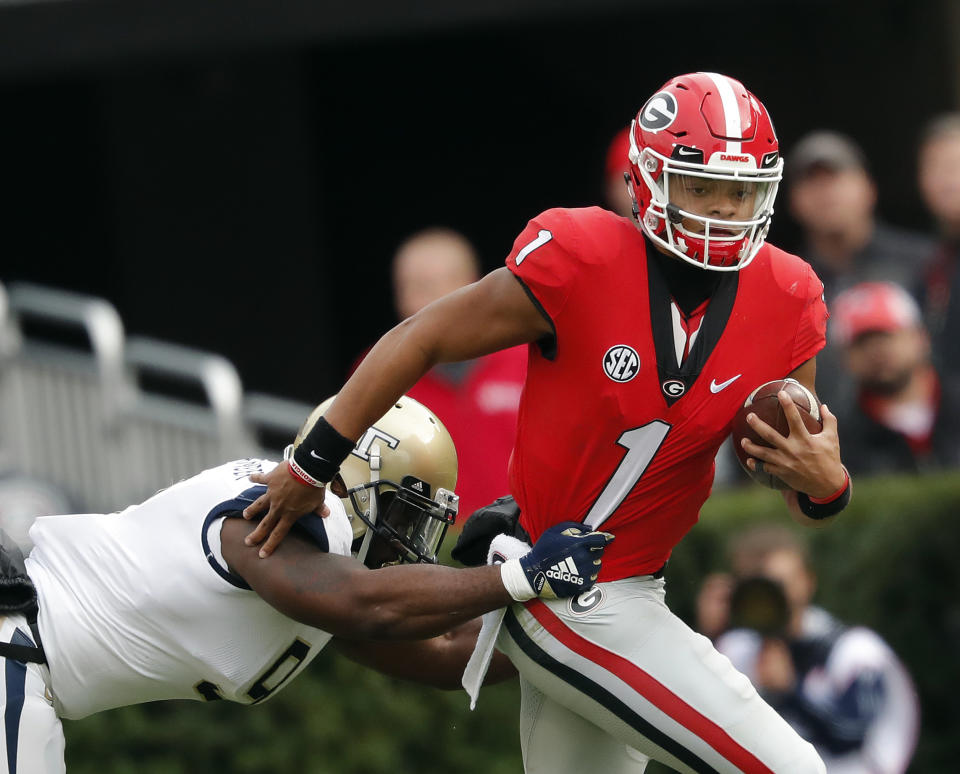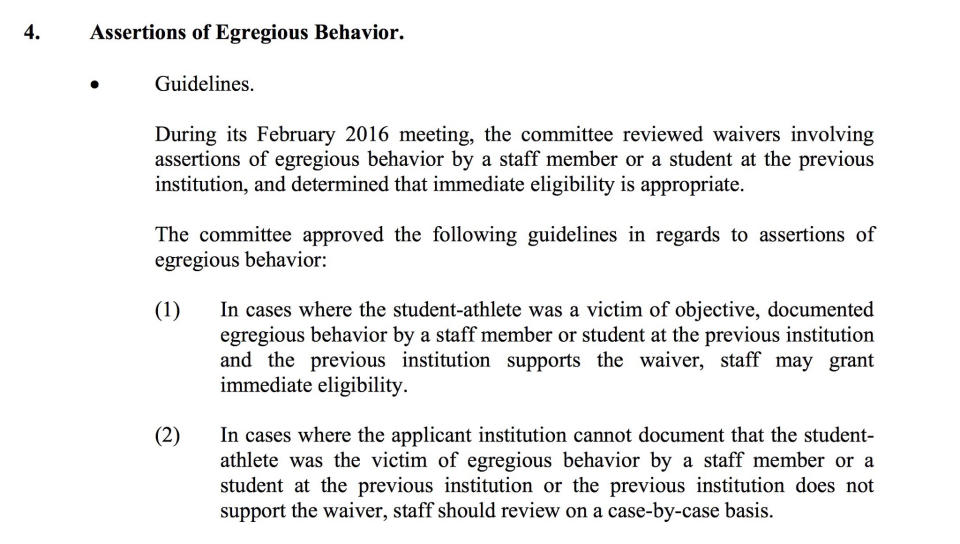Why Justin Fields' eligibility will be college football's biggest offseason storyline

Ryan Day has been on the job at Ohio State for only a few days, but the transaction that looms to define the start of his tenure there is complete. Star quarterback Justin Fields announced on Friday he’s transferring from Georgia.
The move brings an immediate jolt of legitimacy to Day’s hiring at Ohio State, as Fields was the No. 2 quarterback recruit in the country in the 2018 senior class and also considered transferring to Oklahoma.
For Day, it brings a potentially transformative player after the unexpected ascent of quarterback Dwayne Haskins to a potential first-round NFL pick. Fields’ decision to choose Day for his professional development is a paradigm changer for both Day and the Ohio State program.
But with great buzz comes great risk, as the news of Fields’ transfer means immediately that his potential eligibility for the 2019 season becomes the sport’s biggest offseason storyline. Fields played just one season at UGA, where he signed despite watching Jake Fromm lead the Bulldogs to the College Football Playoff title game as a true freshman in 2017. Fields played sparingly in relief of Fromm this season, completing 69 percent of his passes, rushing for four touchdowns and throwing for four more.
Under normal circumstances, Fields would have to sit out a year and wouldn’t be eligible until 2020. But Fields and his family have already contacted attorney Tom Mars, a famed collegiate establishment antagonist, to handle his eligibility case. The argument for immediate eligibility isn’t infallible, but it’s certainly reasonable.
Will Fields be eligible in 2019? It appears from the outside that Day is making a big bet on Mars. Incumbent quarterback Tate Martell appears ready to take on Fields for the quarterback job, as he cryptically tweeted in December: “Word of advice…..don’t swing and miss….especially for a second time.”
He didn’t direct it at Fields, but the shade was obvious. He told media at the Rose Bowl he’s adamant he won’t transfer.
“Why would I leave for someone who hasn’t put a single second into this program?” Martell told The Athletic. “I have put two years of literally working my ass off into something that I’ve been waiting for and a dream I’ve had my whole life.”
If Martell does transfer, it would leave the Buckeyes with three scholarship quarterbacks — Fields, rising redshirt freshman Matthew Baldwin and graduate transfer Chris Chugunov — with Fields the only one having on-field experience. Neither Baldwin or Chugunov has any viable experience, which would make either unlikely to be ready. If Martell transfers and Fields isn’t eligible, Ohio State would be in a bind.
Mars has proven his chops in high-profile college sports cases, ending Hugh Freeze’s tenure at Ole Miss by exposing an infamous call to an escort through dogged public record requests. More relevant to this case, Mars was on the frontline of getting six Ole Miss transfers eligible last year, including Shea Patterson at Michigan and Van Jefferson transferring within the SEC to Florida.
The case for Justin Fields’ eligibility is a compelling one, as it hinges on a racial incident and, potentially, Fields’ potential as a professional baseball player. During Fields’ tenure at Georgia, a baseball player allegedly shouted racial slurs toward him during a September game against Tennessee. The player, Adam Sasser, later issued an apology on Twitter and the school threw Sasser off the team.
The incident is relevant for more than the general ugliness of it. Fields was considered a potential high-round Major League Baseball draft pick in high school, and he’d thought enough about a career in baseball that he was considered a potential MLB draft pick. He also considered playing baseball at Georgia. An MLB scout gave this scouting report to Yahoo Sports in 2017: “Similar situation as Jameis Winston when he was in high school. He’s a better overall athlete and runner for sure, but [Fields’] baseball skills are behind due to all the time he gives to football.”
While Fields put a focus on football, baseball always lingered as a potential option. While he’d yet to exercise that option at UGA, that potential avenue always existed. That means Mars has a strong argument that Fields would never be comfortable playing baseball at UGA, even with Sasser gone from the team.
The NCAA statute that Fields is expected to file his waiver under is the “egregious behavior,” which includes a waiver “involving assertions of egregious behavior by a staff member or student at the previous institution, and determined that immediate eligibility is appropriate.” It’s important to note that this waiver does not require Georgia to grant permission. The rule includes an example of where the student athlete was “a victim of objective, documented egregious behavior” by “a staff member or student at the previous institution.”

The racial element of the case, which the NCAA would be queasy to defend publicly if it rejected Fields’ waiver, combined with the potential baseball revenue aspect make it a case that few can envision the NCAA rejecting.
The NCAA is an organization that’s feeble in the wake of legal challenges and meek amid controversy, which makes coaches in college athletics unaffiliated with the case optimistic about Fields’ chances. The NCAA is sensitive to bad publicity, and sidelining Fields after being the subject of racial slurs would invite headlines the association doesn’t want.
For Ryan Day, the news of Fields’ transfer is so important than it could eventually define the early part of his career at Ohio State. But before anyone pops champagne, Fields and his lawyer have to navigate the NCAA waiver process.
Will high reward come from the high risk? We’ll find out over the next few months, as Ohio State’s 2019 season could hinge on it.
More from Yahoo Sports:
• Forde: College Football Playoff teams show how scoring has supplanted defense as the way to win
• Thamel: How Saban’s evolution changed Alabama
• Bromberg: How the combo of high school offenses and 7-on-7 changed football forever
• Wetzel: Ticket prices plummet for college football title game

 Yahoo Sports
Yahoo Sports 

